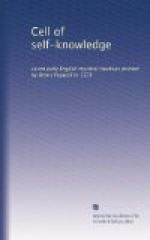[69] Beatus.
[70] Natural.
[71] Murmurs, complains. Cf. Chaucer, The Persones Tale, ed. Skeat SS 30: “After bakbyting cometh grucching or murmuracion; and somtyme it springeth of impacience agayns God, and somtyme agayns man. Agayns God it is, whan a man gruccheth agayn the peynes of helle, or agayns poverte, or los of catel or agayn reyn or tempest; or elles gruccheth that shrewes han prosperitee, or elles for that goode men han adversitee.”
[72] Pepwell adds: at the least willingly.
[73] Pepwell reads: “put down.”
[74] Watches.
[75] Promises. Latin: fovet promissis.
[76] A curious mistranslation: “Sed Aser hosti suo facile illudit dum partem quam tuetur, alta patientiae rupe munitam conspicit” (Benjamin Minor, cap. 33).
[77] Dwelling-place.
[78] Pacified. Harl. Ms. 1022, ed. Horstman, reads: “the cite of conscience is made pesebule.”
[79] Merces.
[80] So Harl. Ms. 674; omitted in Harl, Ms. 1022 and by Pepwell.
[81] Gen. xxx. 18.
[82] The MSS. read: “erles.”
[83] Gen. xlix, 14: “Issachar asinus fortis accubans interterminos” (Vulgate).
[84] Rom. vii. 24.
[85] Phil. i. 23.
[86] Ps iv. 5. Harl. Ms. 674 has: “Wraththes and willeth not synne, or thus: Beeth wrothe and synnith not.”
[87] Human nature in our fellow-man.
[88] Fellow-Christian. The words in square brackets are omitted in Harl. Ms. 674.
[89] Ps. cxxxix. (Vulgate cxxxviii. ) 21.
[90] Ps. cxix. (Vulgate cxviii.) 104.
[91] Habitaculum fortitudinis.
[92] Gen. xxx. 20.
[93] Assuredly. Pepwell sometimes modernises this word, but not invariably.
[94] 1 John i. 8.
[95] Cf. St. Augustine’s various writings against the Pelagians, e.g. Epist. clvii. (Opera, ed. Migne, tom. ii. coll. 374 et seq.), Ad Hilarium.
[96] Deliberate intention.
[97] Warnes in the MSS.
[98] Disposition.
[99] Coaxing, beguiling. Harl. Ms. 674 reads: “glosing.”
[100] Madness.
[101] In particular. Pepwell has: “surely.”
[102] Regret.
[103] Better is art than evil strength. A proverbial expression. Cf. Layamons Brut, 17210 (ed Madden, ii. p. 297); Ancren Riwle (ed. Morton), p. 268 (where it is rendered: “Skilful prudence is better than rude force"). Cf. Prov. xxi. 22.
[104] The MSS. have: “ilke.”
[105] Invisibilia.
[106] So Pepwell and Harl. Ms. 674. Harl. Ms. 1022, ed. Horstman, reads: “see thiself and the candell.”
[107] Pepwell reads: “waking.”
[108] Ps. iv. 6-7.
[109] Harl. Ms. 674 reads: “light.”
[110] Salutary.
[111] Skill.




